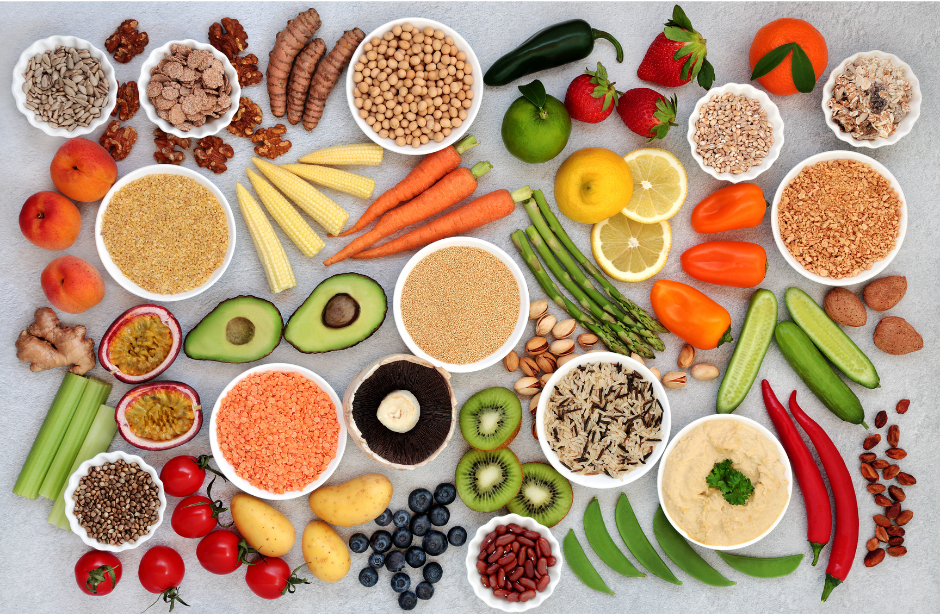Studies suggest practicing mindfulness helps us manage stress, cope better with serious illnesses, and reduce anxiety and depression.
Many people, including myself, practice mindfulness to relax, overcome life challenges, and be more optimistic.
This is particularly important for Carergivers like us because life stresses and mental ill health often leads to emotional distress, inability to cope, poor emotional wellbeing, and – at its worse – a breakdown.
Practicing mindfulness can help overcome challenges. It provides resolve to think more clearly, improve self-esteem, and clarify the direction to take in life – professionally and personally. This was certainly true for me when I started practicing mindful activities.
There is, of course, another thing medically proven to improve mental health – ‘brain food’. So much has been documented about the relationship between the gut and the brain in recent years.
Our gastrointestinal system plays an important role in brain health, and our meals directly impact brain function. By eating certain foods with key nutrients, mood, memory, and concentration improves.
What is mindfulness and how does it work?
Contrary to its literal description, ‘mindfulness’ is not activities that make us focus on the issues causing stress and anxiety.
Based on experience, it’s the tricks and practices that lift mood and zap out negative thoughts. Such techniques are wonderful as they divert attention and transport you to a space where you can breathe.
I believe mindfulness works by getting us to undertake activities that distract attention and disrupt negative thoughts. At the same time, senses are stimulated to focus on positive things and body parts away from the brain.
Some mindful activities also get us to openly express emotions and release negative thoughts. In turn, this causes catharsis providing psychological relief.
From experience, some activities disrupt negative thoughts by stimulating and engaging sight, sound, touch, smell, and taste. Others prevent dwelling on the negative by refocusing thoughts to positive aspects of life.

Types of mindful activities to improve mental health
Through training and research, I’ve learned that there are different categories of mindful activities and mental health.
Firstly, there is the mental health continuum, a broad spectrum of where we can be, individually – in terms of our mental health – at any point.
Then, there are different categories of mindful activities, that improve and maintain mental health and well-being.
If you run a search, you’ll see the 4 P’s of mindfulness, the 4 R’s, and the 9 rules, among others.
This blog focuses on the 4 C’s because I resonate with them through my own experience and practices.
The 4 C’s of mindfulness: creativity, culture, contemplate, community
Creativity
- Journal – get creative by recording your personal and/or secretive thoughts as a way to let off steam, exercise cathartic release, and feel more in touch with your emotions and connected to yourself.
- Gratitude list – improve well-being and promote positivity by creating a gratitude list of things that you’re thankful for. Personally, I keep a mental list and not a physical one.
- Read – if you enjoy crime fiction, like me, reading is wonderful for the creative mind. If you’ve watched a book-based film, I think you’ll agree book is better owing to the powerful human imagination!
- Use your hands – whether it’s art, painting, drawing, crafting, gardening, or DIY, getting creative focuses attention and the mind on the task at hand!
- Engage your senses – through the ‘5, 4, 3, 2, 1’ anxiety trick. It’s often used by anxious people to calm nerves and reduce anxious feelings. The technique simply asks you to find five things to ‘see’, four things to ‘touch’, three things to ‘hear’, two things to ‘smell’, and one thing to ‘taste’. Try it and let me know what you think!

Culture
- Listen – music is a great form of therapy and in the context of mindfulness try a podcast. To get mindful, I often listen to my favourite playlists, comprising 90s classics, bluesy-rock, ballads, and Canto-pop!
- Eat – stimulating tastebuds by eating wholesome and tasty foods is a great stress reliever. It focuses the senses on an area of the body away from the brain. Apart from eating, preparing food and cooking is also cathartic. Again, it makes you focus and concentrate on something other than the negative thoughts running through the mind.
- Stretch/yoga/pilates – I stretch and practice yoga / pilates to reduce muscle tension and tightness. It worked wonderfully to eradicate sciatica and helps with shoulder and neck pains. Stretching also increases serotonin, the mood stabilising and stress reducing hormone!
Contemplate
- Breathe – we improve mental health by breathing, and research shows that brain associates different emotions with different breathing patterns. We can, therefore, trick our brains to thinking our emotional state is different to what it actually is! Here’s more about how to breathe well and improve asthma (for those living with the condition, like me).
- Meditate – we improve brain health and gain mental strength through meditation. This is because meditating increases the size and strength of the prefrontal cortex, the brain area associated with resilience and mental toughness. It’s also widely believed that meditation helps us keep a clear mind and be less overwhelmed with thoughts during challenging and stressful situations.
- Live in the moment/be present – this mindful activity diverts attention away from negative worries to focus on the here and now. You can focus on small things as long as they’re positive. Daydream out the window, admire the birds, and appreciate the blue sky and moving clouds. Engage in things that make you smile or laugh, or perform acts of kindness and generosity like volunteering, recycling, or donating to charity shop.
- Walk / Run / Drive – all of these reduce stress, anxiety, and depression. Running and walking are excellent forms of cardiovascular exercise that improve sleep, mood, and endurance. Personally, I love walking or driving listening to favourite tunes!

Community
Networks, communities and communication – connecting and interacting with those closest and/or most trusted to you (i.e. friends and family) improves well-being.
Sometimes, we connect to offload. Other times, we just need the distraction and an uplift – and that’s okay. It is perfectly normal to call on that friend who you know will listen to you, chat with you, and make you laugh – without judgement. Reminiscing, sharing experiences and stories, and exchanging tips and advice is cathartic.

After all, we are human and social beings. We don’t need an excuse to connect, vent, offload, talk, ask for advice, laugh, and cry! All of this is natural – we all encounter these emotions and should come together to experience them together. It is more than okay to call on your networks and communities, as and when required, to communicate and connect in the way you need to.
No doubt, you get called on too and can return the favour!

How food affects our brain?
The gut-brain connection
The human body is amazing and everything is interlinked. Gut-brain connection refers to how our gut communicates with the brain, and vice versa. They are connected by the vagus nerve, a long nerve that starts in the brain – the part of the brain that processes and expresses fear and anxiety – and goes down through the gastrointestinal system to the gut.
Communication between gut and brain happens through chemical messages with 90% of signalling going from gut to brain and 10% from brain downwards.
This is why gut health is key for mood regulation and brain health.
How food affects our brain
What we eat and put in our stomach impacts on brain health. Because of the gut-brain connection, the foods we eat can affect memory, learning, behaviour and mood. Over time, bad food (see below) can increase the risk of health conditions like dementia and Alzheimer’s disease.
This is because foods that are high in sugar, trans fats and artificial ingredients cause inflammation in the body and the brain, which can increase the risk of such diseases in the long-run.
Bad foods for brain health
Refined carbohydrates
- Like pasta, bread, pastries, pizza, pies, and cakes. Wholemeal carbohydrates / pasta / bread are better
Snacks
- Such as crisps, chocolate, cakes, granola / energy / protein bars, crackers and pretzels are high in sugar
Sugary drinks
- Juices, fizzy drinks, energy drinks and sport drinks all contain a lot of sugar. These drinks can also contain a sweetener called high-fructose corn syrup, which the body cannot effectively breakdown. Unfortunately this can lead to diabetes, insulin resistance, high blood pressure and obesity.
High sugar fruits
- Mangoes, lychees, passionfruit and cherries are great but best eaten in moderation
Trans fats
- These are a type of unsaturated fat found in refined vegetable oils like rapeseed oil, margarine, baked products (muffins, pizza, cookies, cakes, pastries, doughnuts, sausage rolls), fried foods (chips, hamburgers, battered fish), crisps and crackers.
Ready meals and packaged / processed foods
- Including pizzas, instant noodles, deli meats and hams, breakfast cereals, baked beans, spaghetti hoops and tinned soups
Pasteurised dairy products
- Products like milk, yoghurt and cheese can negatively affect our gut-brain health as dairy is both acidic and inflammatory
Alcohol
- An inflammatory drink and in large amounts, can damage nerve cells, making it difficult for brain cells to communicate. This can lead to memory loss and issues with eyesight and balance.
Coffee
- A nervous system stimulant that can surge adrenaline and cortisol production, which increases heart rate and blood pressure. Drinking coffee can interrupt sleep, negatively affect blood sugar levels and contribute to anxiety.
Best foods for brain health

Blueberries
- High in antioxidant and beneficial for gut bacteria and cognitive function
Broccoli
- Helps to lower the risk of diseases like Alzheimer’s and Parkinson’s disease.
Leafy greens
- Greens like kale, spinach, and rocket are rich is essential B vitamins, vitamin E and vitamin K and minerals, which support brain health and improve memory and focus.
Pumpkin seeds & sunflower seeds
- Packed with antioxidants and minerals that help protect the brain. Sunflower seeds are also rich in thiamine (B1), an important vitamin for memory and cognition.
Brazil nuts
- Contain a type of antioxidant that has anti-inflammatory properties to protect the brain from damage
Foods high in omega-3 fatty acids
- Chia seeds, flaxseeds, walnuts and small oily fish like sardines or mackerel
Bananas
- Release serotonin in the body to help support healthy gut function and mood.
Turmeric
- Powerful with anti-inflammatory and antioxidant properties that has proven to help brain cells grow and improve memory and mood
Rosemary
- Stimulates blood flow to and from tissues and organs and contains a compound that can protect the brain from chemicals and environmental toxins. The aroma of rosemary has shown to improve mood, concentration and performance too. So, next time you cook or make a drink try adding this herb. Of course, you can also use rosemary essential oil in vaporisers, baths, or directly on the skin.
Cayenne pepper
- Renown for its ability to get blood to the brain. It improves circulation and blood flow, and can support the detoxification of the blood system. It’s rich in vitamin A and E, which are important for repairing damaged tissues, slowing down the ageing process and reducing inflammation – especially in the brain and surrounding tissues. Add it to soups, stews and salad dressings for a healthy and tasty meal!
Whole grains
- Including oats, quinoa, buckwheat, and barley contain vitamins and minerals to reduce inflammation in the brain and improve cognitive function
Beans and pulses
- Lentils, chickpeas, and kidney beans are high in fibre, vitamin B and omega-3, which provide a steady supply of fuel to the brain to boost concentration and memory.
Filtered water
- Together with lemon, peppermint or cucumber works wonders. For a hot drink opt for something like turmeric latte or ginger tea.
Low-sugar fruits
- Strawberries, raspberries, kiwi and grapefruit are better than high-sugar fruits such as mangoes, lychees, passionfruit and cherries, which should be eaten in moderation.
For more insight like this, check out the College of Naturopathic Medicine.
I hope this blog shows how practicing mindfulness and eating well can help to keep our mental health in check. If you have other tips and advice to share, please let me know.
I would love to hear from you!



